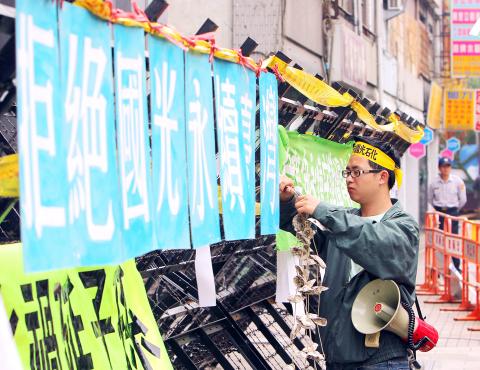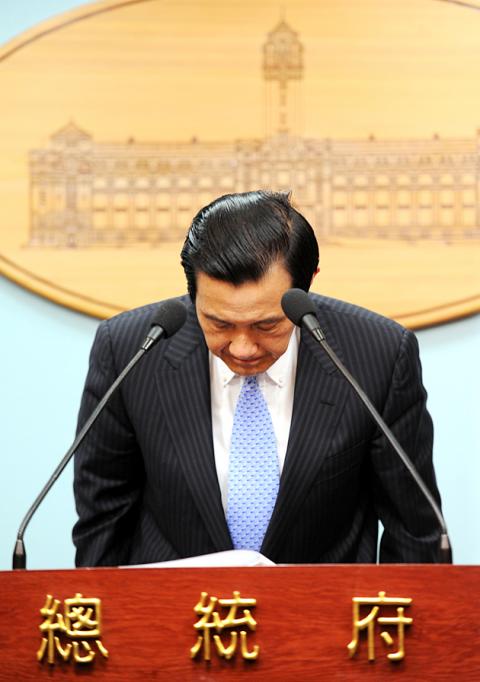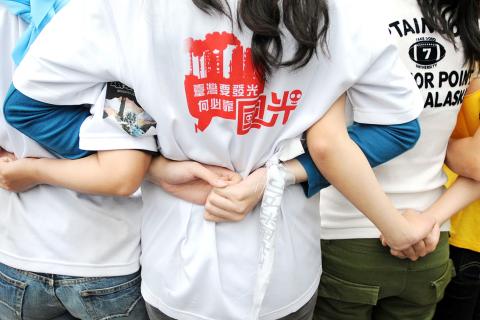A review taskforce yesterday failed to reach a final conclusion on the future of a proposed Kuokuang Petrochemical Technology Co’s (KPTC, 國光石化) naphtha cracker complex and proposed two scenarios to be evaluated by the Environmental Impact Assessment (EIA) Committee next month, a decision that did not please environmentalists.
EIA Committee member Chiang Pen-chi (蔣本基), who presided at the meeting, said the two options were that the committee either reject the project, which was planned to be constructed in Dacheng Township (大城), Changhua County, or give it conditional approval. In all, 11 reasons were given as to why the project should be abandoned and 24 conditions were listed if conditional approval were given.
About 40 minutes after the second day of meetings by the taskforce concluded at 3pm, President Ma Ying-jeou (馬英九) told a press conference at the Presidential Office that he opposed building the project in Changhua County.

Photo: CNA
Leading top government officials in explaining the government’s position on the matter, Ma said the complex, which was to be built in a wetland area, would have an “unbearable” impact on the local ecology and environment, and that the government should take the initiative in halting the project.
“The impact caused by the complex would be unbearable for the town and its people, and as an arbiter, it’s time for us to declare our stance,” Ma said.
“However, we will not and cannot give up on the petrochemical industry,” he said, adding that the Cabinet would start a thorough examination on the development of the industry.

Photo: Lo Pei-der, Taipei Times
Ma said the Council of Economic Affairs would instruct state-run refiner CPC Corp, Taiwan (CPC, 台灣中油), the largest shareholder of KPTC, to reject building the complex in Changhua during a shareholders’ meeting next week.
CPC Taiwan holds 43 percent of Kuokuang’s shares, with the remaining 57 percent held by private investors.
“I know [halting the project] is a difficult decision to make and the decision will have a substantial impact on the petrochemical industry and Dacheng Township,” Ma said. “However, the decision gives us a chance to seek balance between economic development and environmental protection.”

Photo: Wang Yi-sung, Taipei Times
Ma said the decision was made after a series of discussions on the issue with environmental groups, local residents and experts. He denied the decision was made to please local residents for electoral purposes.
Ma accused the Democratic Progressive Party (DPP) of planning the complex and leaving the thorny issue for his administration, adding that his administration took the responsibility to solve the problem when it was determined that the proposed site was inappropriate.
The Council of Economic Affairs will also assist KPTC in weighing other options, including moving the complex abroad, while helping the township create more employment.
Minister of Economic Affairs Shih Yen-shiang (施顏祥) said it would be difficult to find another location in Taiwan for the complex, which required a large plot of land, but declined to confirm whether the ministry would move the project to another country.
When asked about the negative impact of the halted complex on the local economy and the development of the petrochemical industry, Shih said the ministry would ensure the supply chain remained sufficient, adding that a cross--departmental discussion on the development of the industry would be held.
Yesterday’s decision by the taskforce and Ma’s announcement were met with a cool response from environmental activists, who had staged sit-in protests in front of the Environmental Protection Administration (EPA) for three days.
After the ruling, protesters called yesterday “a sad Earth Day.”
Representatives said they refused to buy Ma’s declaration and said his exclusion of Changhua from the list of possible sites for the proposed complex was simply intended to shift the focus of the issue.
The environmentalists refused to meet Ma at a traditional meeting to observe Earth Day and instead held a demonstration outside the Presidential Office to demand that the project be scrapped altogether.
Although Presidential Office spokesman Lo Chih-chiang (羅智強) tried to soothe the angry crowd and invite some of them into the office, they refused the offer and insisted they would not make any concessions over the matter.
The discontent also spread to two experts on the taskforce — Chan Chang-chuan (詹長權) of National Taiwan University and James Liu (劉祖乾) of National Chung Shan University — who said they were not pleased with the turn of events.
“The ruling was pre-determined and deviates from professional judgment,” Chan said. “This sets a bad example for the public. How could such an irresponsible and equivocal decision be made?”
Chan also accused Chiang of being reluctant to put the project to a vote, adding that the way Chiang interpreted the information differed markedly from most people’s understanding.
Commenting on the ruling, KPTC chairman Chen Bao-lang (陳寶郎) said the company would carefully study the terms of the ruling and then discuss them with its shareholders.
The EIA committee has held 24 meetings over the location of the plant. While experts on the committee have evaluated the project’s negative impact on the environment, Chen said they have never addressed the positive contributions the project would make to the economy.
Asked whether the company was contemplating other locations for the complex, Chen said the company had yet to discuss such options.
However, sources at the EPA said KPTC was likely to drop the bid before the EIA members meet at the general assembly next month, as Ma had clearly indicated his stance on the issue.
ADDITIONAL REPORTING BY CNA

NATIONAL SECURITY THREAT: An official said that Guan Guan’s comments had gone beyond the threshold of free speech, as she advocated for the destruction of the ROC China-born media influencer Guan Guan’s (關關) residency permit has been revoked for repeatedly posting pro-China content that threatens national security, the National Immigration Agency said yesterday. Guan Guan has said many controversial things in her videos posted to Douyin (抖音), including “the red flag will soon be painted all over Taiwan” and “Taiwan is an inseparable part of China,” while expressing hope for expedited “reunification.” The agency received multiple reports alleging that Guan Guan had advocated for armed reunification last year. After investigating, the agency last month issued a notice requiring her to appear and account for her actions. Guan Guan appeared as required,

A Vietnamese migrant worker yesterday won NT$12 million (US$379,627) on a Lunar New Year scratch card in Kaohsiung as part of Taiwan Lottery Co’s (台灣彩券) “NT$12 Million Grand Fortune” (1200萬大吉利) game. The man was the first top-prize winner of the new game launched on Jan. 6 to mark the Lunar New Year. Three Vietnamese migrant workers visited a Taiwan Lottery shop on Xinyue Street in Kaohsiung’s Gangshan District (崗山), a store representative said. The player bought multiple tickets and, after winning nothing, held the final lottery ticket in one hand and rubbed the store’s statue of the Maitreya Buddha’s belly with the other,

‘NATO-PLUS’: ‘Our strategic partners in the Indo-Pacific are facing increasing aggression by the Chinese Communist Party,’ US Representative Rob Wittman said The US House of Representatives on Monday released its version of the Consolidated Appropriations Act, which includes US$1.15 billion to support security cooperation with Taiwan. The omnibus act, covering US$1.2 trillion of spending, allocates US$1 billion for the Taiwan Security Cooperation Initiative, as well as US$150 million for the replacement of defense articles and reimbursement of defense services provided to Taiwan. The fund allocations were based on the US National Defense Authorization Act for fiscal 2026 that was passed by the US Congress last month and authorized up to US$1 billion to the US Defense Security Cooperation Agency in support of the

CLASSIFIED BRIEFING: The ministry said the special budget focuses on building a comprehensive defense system and strengthening the domestic defense industry The Ministry of National Defense yesterday released information on seven categories of weapons systems to be procured under a stalled NT$1.25 trillion (US$39.57 billion) special defense budget, including precision artillery, long-range missiles, air defense anti-tank missiles and more than 200,000 uncrewed aerial vehicles (UAVs). The Executive Yuan approved a draft version of the budget on Nov. 27 last year and submitted it to the legislature for review. The legislature’s Foreign Affairs and National Defense Committee yesterday invited Minister of National Defense Wellington Koo (顧立雄) to deliver a classified briefing and answer questions at a closed-door session. Koo said he hoped to provide lawmakers